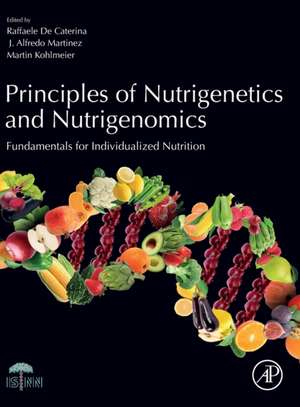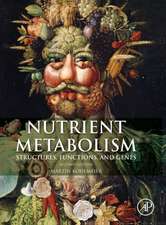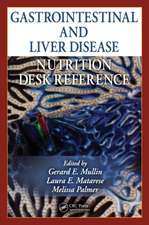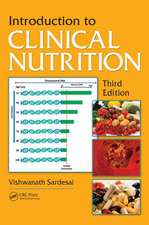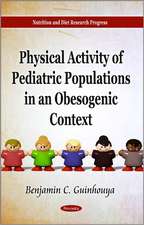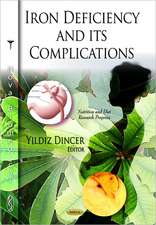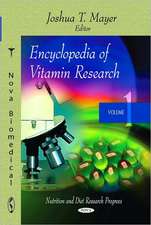Principles of Nutrigenetics and Nutrigenomics: Fundamentals of Individualized Nutrition
Editat de Raffaele De Caterina, J. Alfredo Martinez, Martin Kohlmeieren Limba Engleză Hardback – 19 sep 2019
Preț: 2135.49 lei
Preț vechi: 2867.13 lei
-26% Nou
Puncte Express: 3203
Preț estimativ în valută:
408.66€ • 424.24$ • 340.77£
408.66€ • 424.24$ • 340.77£
Carte tipărită la comandă
Livrare economică 17-31 martie
Preluare comenzi: 021 569.72.76
Specificații
ISBN-13: 9780128045725
ISBN-10: 0128045728
Pagini: 586
Dimensiuni: 216 x 276 x 39 mm
Greutate: 1.63 kg
Editura: ELSEVIER SCIENCE
ISBN-10: 0128045728
Pagini: 586
Dimensiuni: 216 x 276 x 39 mm
Greutate: 1.63 kg
Editura: ELSEVIER SCIENCE
Cuprins
Section 1: The biological basis of heritability and diversity
1. The nature of traits, genes and variation
2. Molecular biology of genetic variants
3. Regulation of Gene Expression
4. The role of nutrition in DNA replication, DNA damage prevention and DNA repair
5. Genotyping and sequencing
6. RNA analyses
7. Methods in Nutrigenomics for precision nutrition
8. Epigenetics: Methodology and tools for nutrition research
9. Proteomic analyses
10. Metabolomic analyses
11. Metagenomics
12. A Broader View on Omics and Systems Biology
13. Study design in genomic epidemiology
14. Epistemology of nutrigenetic knowledge
Section 2: Nutrigenetics
15. Nutrigenetics and the early life origins of health and disease: effects of protein restriction
16. Perinatal nutrition
17. Epigenetics Mechanisms
18. Genetics of Chrononutrition
19. Newborn screening
20. Genomics of Eating Behavior and Appetite Regulation
21. Genetics of Body Composition: From Severe Obesity to Extreme Leanness
22. Genetic regulation of energy homeostasis: obesity implications
23. Genetic variations in the response to weight-loss diets
24. Genetic variations in the response to exercise: impact on physical fitness and performance
25. Genetic variations impacting the response to defined diets
26. Carbohydrates
27. Monounsaturated and Saturated Fatty Acids
28. Omega-3 and omega-6 fatty acids
29. Blood cholesterol
30. Genetic Individuality and Alcoholic Consumption
31. Vitamin A and other carotenoids
32. Vitamin D
33. Vitamin E
34. Vitamin K
35. Vitamins as Cofactors for Energy Homeostasis: Biotin, Thiamine and Pantothenic Acid
36. Vitamin C
37. Vitamin B2
38. Niacin
39. Folate, vitamin B6, vitamin B12
40. Choline
41. Electrolytes
42. Iron
43. Trace elements
44. Polyphenols and Nutrigenetic/Nutrigenomic Associations with Obesity-Related Metabolic Diseases
45. Caffeine
46. Phytanic acid
47. Cognitive function
48. Cardiovascular Disease
49. Hemostasis and thrombosis
50. Diabetes mellitus
51. Bone health
52. Nutrients and Genes in the Liver
53. Hyperuricemia and gout
54. Aging
55. Epigenetics in food allergies: the missing piece of the puzzle
56. Gut microbiota and their influence on the response to foods
Section 3: Nutrigenomics
57. Nutrients and Gene Expression in Development
58. Nutrients and gene expression in Obesity
59. Nutrients and gene expression in Diabetes
60. Gene expression in dyslipidemias
61. Nutrients and gene expression in Inflammation
62. Nutrients and gene expression in Cardiovascular Disease
63. Nutrients and Gene Expression in Cancer
64. Nutrients and Gene Expression Affecting Bone Metabolism
Section 4: Translational nutrigenetics and nutrigenomics
65. Nutrigenetics-based intervention studies
66. Genome-based nutrition guidance
67. Nutrigenomics of food pesticides
68. Pharmaconutrigenetics: the impact of genetics on nutrient-drug interactions
69. Setting genome-directed guidelines and algorithms
70. Direct-to-consumer services
71. Privacy risks and protective measures
72. Ethical considerations in nutrigenetics and nutrigenomics
73. Impact of Nutrigenetics and Nutrigenomics on Society
1. The nature of traits, genes and variation
2. Molecular biology of genetic variants
3. Regulation of Gene Expression
4. The role of nutrition in DNA replication, DNA damage prevention and DNA repair
5. Genotyping and sequencing
6. RNA analyses
7. Methods in Nutrigenomics for precision nutrition
8. Epigenetics: Methodology and tools for nutrition research
9. Proteomic analyses
10. Metabolomic analyses
11. Metagenomics
12. A Broader View on Omics and Systems Biology
13. Study design in genomic epidemiology
14. Epistemology of nutrigenetic knowledge
Section 2: Nutrigenetics
15. Nutrigenetics and the early life origins of health and disease: effects of protein restriction
16. Perinatal nutrition
17. Epigenetics Mechanisms
18. Genetics of Chrononutrition
19. Newborn screening
20. Genomics of Eating Behavior and Appetite Regulation
21. Genetics of Body Composition: From Severe Obesity to Extreme Leanness
22. Genetic regulation of energy homeostasis: obesity implications
23. Genetic variations in the response to weight-loss diets
24. Genetic variations in the response to exercise: impact on physical fitness and performance
25. Genetic variations impacting the response to defined diets
26. Carbohydrates
27. Monounsaturated and Saturated Fatty Acids
28. Omega-3 and omega-6 fatty acids
29. Blood cholesterol
30. Genetic Individuality and Alcoholic Consumption
31. Vitamin A and other carotenoids
32. Vitamin D
33. Vitamin E
34. Vitamin K
35. Vitamins as Cofactors for Energy Homeostasis: Biotin, Thiamine and Pantothenic Acid
36. Vitamin C
37. Vitamin B2
38. Niacin
39. Folate, vitamin B6, vitamin B12
40. Choline
41. Electrolytes
42. Iron
43. Trace elements
44. Polyphenols and Nutrigenetic/Nutrigenomic Associations with Obesity-Related Metabolic Diseases
45. Caffeine
46. Phytanic acid
47. Cognitive function
48. Cardiovascular Disease
49. Hemostasis and thrombosis
50. Diabetes mellitus
51. Bone health
52. Nutrients and Genes in the Liver
53. Hyperuricemia and gout
54. Aging
55. Epigenetics in food allergies: the missing piece of the puzzle
56. Gut microbiota and their influence on the response to foods
Section 3: Nutrigenomics
57. Nutrients and Gene Expression in Development
58. Nutrients and gene expression in Obesity
59. Nutrients and gene expression in Diabetes
60. Gene expression in dyslipidemias
61. Nutrients and gene expression in Inflammation
62. Nutrients and gene expression in Cardiovascular Disease
63. Nutrients and Gene Expression in Cancer
64. Nutrients and Gene Expression Affecting Bone Metabolism
Section 4: Translational nutrigenetics and nutrigenomics
65. Nutrigenetics-based intervention studies
66. Genome-based nutrition guidance
67. Nutrigenomics of food pesticides
68. Pharmaconutrigenetics: the impact of genetics on nutrient-drug interactions
69. Setting genome-directed guidelines and algorithms
70. Direct-to-consumer services
71. Privacy risks and protective measures
72. Ethical considerations in nutrigenetics and nutrigenomics
73. Impact of Nutrigenetics and Nutrigenomics on Society
